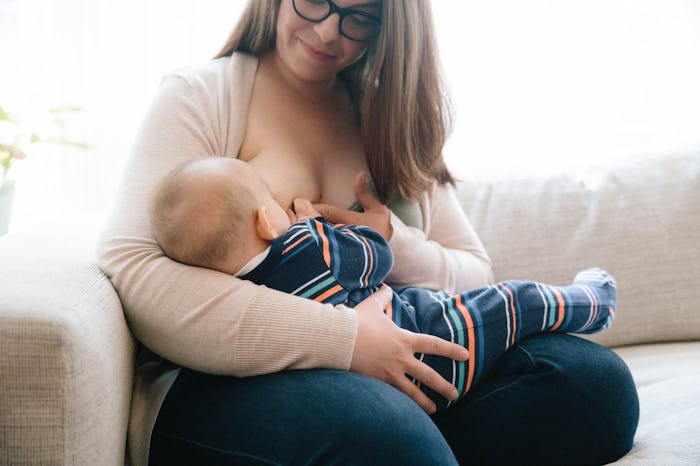My son breastfed for a very long time — over 18 months. He just couldn't give up the night feedings. When he was about 15 months old, I wanted to try for baby number two. I had to know, should I stop breastfeeding if I'm trying to get pregnant? Because, in my mind at least, it was entirely possible that I'd end up weaning a kindergartener.
Popular nursing website Kelly Mom cited breastfeeding exclusively and around the clock as an excellent form of birth control. It keeps the woman from ovulating, and keeps her period from returning. The site also noted that women are likely to begin having their period as their child nurses less frequently, but that ovulation often doesn't occur until about six months later. Without ovulation, there's nothing to fertilize. (Also, getting your period when it is essentially doing squat just seems like insult to injury, right?) This is basically saying that you might get your period back four to six months after your baby is born when you introduce solid foods, and then you might not ovulate for another six months after that. All told, you're looking at a possible year of non-fertility. (Not to be confused with infertility.)
It's worth noting, however, that the La Leche League International (LLLI) suggested that it's entirely possible to get pregnant while breastfeeding, if not a bit more challenging. LLLI recommended spacing out feedings, introducing solids, and giving up night nursing to stimulate ovulation. But is there an alternative? Is it just, "Should I stop breastfeeding if I'm trying to get pregnant?" Or could it be, "What can I do to get pregnant while I continue breastfeeding?"
For its part, the scholarly 2014 text Global Population and Reproductive Health mostly agrees with Kelly Mom and LLLI. There is a definite causational pattern between breastfeeding and reduced fecundity in women. However, the book also found that it's not all it seems, either. Most of the statistical data is collected worldwide and is decades-long. This does not account for women in areas where cultural taboos prohibit having sex for extended periods of time after childbirth, or women with access to consistent, adequate nutrition. I wonder if my addiction to Jamba Juice while nursing counts as consistently adequate or kidding myself?
But there's an alternative theory out there that's been circling the waters for about 20 years that hasn't seen a ton of research dollars, but shows a lot of promise. It's called the "metabolic load hypothesis."
What is that, you say? It works on the premise that it's not some magical hormonal quality to the bonding process and nursing or manufacturing of milk that causes the ovulation suppression in breastfeeding mothers, but the calorie and energy deficit created by breastfeeding and early motherhood, according to The American Journal of Human Biology. Researchers hypothesized that intervals of increased caloric consumption can jolt women into ovulating earlier even while they breastfeed. You read that right — it's possible that you can switch on your body's baby-making system by stepping up to the counter at Shake Shack. I'm calling that a win. (Double fries, double shack sauce, double salt, please.) Mind you, it's just a hypothesis at this point. It needs more money thrown at it, and more bodies testing it, but it is showing real promise.
The current literature does prescribe decreasing (not eliminating) feedings and introducing solids to jumpstart your fertility, but maybe try an extra helping or two of your own for science? Regardless of how long you plan to breastfeed, it's worth talking to your doctor if you're trying to conceive so you can make an informed decision.
